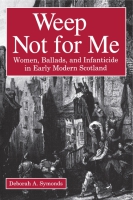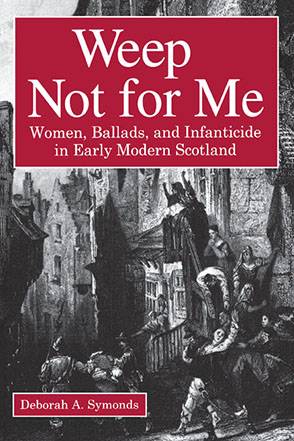Weep Not for Me
Women, Ballads, and Infanticide in Early Modern Scotland
Deborah A. Symonds
“This important and engaging book blends social, economic, literary, and cultural history into a penetrating and sympathetic portrait of the dangers of love and courtship in the lives of marginal working women engulfed by the flood of historical change. Beautifully written, Symonds’ narrative draws readers into a long-gone world, inviting them to recognize the lives and imaginations of eighteenth-century Scottish women as intrinsically interesting and strangely similar to the lives of many women today.”
- Description
- Reviews
- Bio
- Subjects
Using these ballads, together with court records of women tried for infanticide, Symonds makes fascinating points about the shifting meaning of womanhood in the eighteenth century, the roles of politically astute lawyers in that shift, and the significance of ballad singing as a response. She also discusses the political implications of Walter Scott's infanticide novel, The Heart of Mid-Lothian, for women and for the ballad heroine. While some historians have argued that women's history has little to do with the watershed events of textbook history, Symonds convincingly shows us that the democratic and economic revolutions of the late eighteenth century were just as momentous for women as for men, even if their effects on women were quite different.
“This important and engaging book blends social, economic, literary, and cultural history into a penetrating and sympathetic portrait of the dangers of love and courtship in the lives of marginal working women engulfed by the flood of historical change. Beautifully written, Symonds’ narrative draws readers into a long-gone world, inviting them to recognize the lives and imaginations of eighteenth-century Scottish women as intrinsically interesting and strangely similar to the lives of many women today.”
“This is an authentically fresh work. It offers important new understanding of the meaning of female crime, especially infanticide, which remains poorly understood today. Brilliantly researched and beautifully written, it challenges historians of other places and periods to ask how the practice of infanticide has changed in response to social and economic dislocation—on the American frontier, for example.”
Deborah A. Symonds is Associate Professor of History at Drake University.
Mailing List
Subscribe to our mailing list and be notified about new titles, journals and catalogs.




